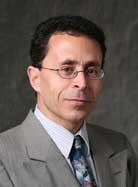
Dr. Zeghal research interests include: Computational Soil Micro-Mechanics, Geotechnical-System Identification, Seismic Response Monitoring, and Information Technology Applications in Geomechnics. He is active with the Center for Network for Earthquake Engineering Simulation (CEES), Scientific Computation Research Center (SCOREC) and the Inverse Problems Center (IPRPI). Failure of geosystems due to natural or man-made hazards such as hurricanes, floods, earthquakes, or terrorist attacks may have monumental repercussions, sometimes with dramatic and unanticipated consequences on human life and the country’s economy. Dr. Zeghal’s research focuses on three areas that are central to the national effort to reduce the impact of these hazards: (1) multiscale modeling of geosystems, (2) model validation and calibration, and (3) development of improved optimal design tools. The methodology of evaluating and predicting the performance of geosystems is undergoing a significant paradigm shift. Computational simulations are destined to become more prominent than empirical approaches and will ultimately become the main tool for analysis and design of civil systems. A hierarchy of adaptive and cost-effective computational models capable of accurately predicting the multiscale and multiphysics response of geosystems is being developed. This hierarchy enables a seamless handling of the initiation and evolution of the various response and failure mechanisms of soils under extreme loading conditions. The hierarchical models range from homogenized continuum to discontinuous coarse-particle formulations. A class of innovative system identification and inverse problem tools are being developed to calibrate these models using experimental data ranging from soil sample and centrifuge tests to full-scale and field tests. This new generation of computational procedures is being translated to practice through careful interactions with practitioners (from industry and government laboratories) and the introduction of changes in the educational curricula of our students.